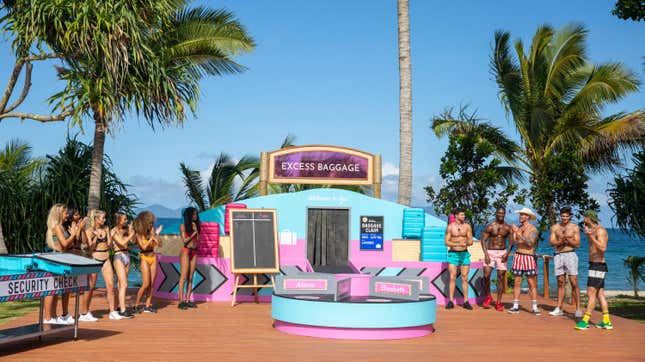

The highlight of the Bachelor franchise is, inarguably, Bachelor in Paradise, where previous seasons’ losers—10 women and 10 men—get together for another shot at love. Much like The Bachelor and The Bachelorette, the goal for contestants is to get engaged, but in a tropical location instead of the mansion. Before diving into the first week of the U.S. version of the hit U.K. reality series Love Island, I assumed the show would be similar to Paradise. But after watching the first week of real-time episodes, starting with last Tuesday’s premiere, I’m pleased to report it is nothing of the sort. No prior knowledge of the franchise is necessary to enjoy the debauchery. In fact, the more naive you are to the scenario—the more you can suspend your understanding of reality—the better.
Six women and six men, all straight, arrive at some island nirvana (for the U.S. format, its Fiji), with the hope of finding love and becoming the last couple standing over the course of six weeks, after which the winning couple is awarded $100,000. In the English version, from what I can tell, the men are placed in a row in front of the villa to decide whether or not they’re attracted to the women, who are paraded out one by one—a mortifying process that is flipped when the women get to call the first shots in Love Island U.S.—a wise decision on the CBS producers’ part.
From there, the contestants, referred to as “Islanders,” are paired off into individual couples and forced to share a bed—shocking if only because American prudishness hasn’t allowed for that sort of thing on a reality show right out the gate—but no one is beholden to their person. They can flirt, or they can decide to switch partners once fresh blood is added. In some episodes, fans watching at home vote for their favorites to go on dates. In others, the show mimics The Challenge, and physical obstacles are made sexy.
Because of the hodgepodge approach to provocation, Love Island is an absolute shit show of drunk 20-somethings hoping to never stop being polite and wish to avoid getting real. Shenanigans vary from the childlike guilelessness of partnering with someone after a few seconds together to an absolute moral nightmare, where people, their emotions and self-perception, are moldable and dispensable. The blonde Elizabeth Weber hates beards, and Zac Mirabelli doesn’t have a beard, so naturally they’re soulmates. Caroline “Caro” Viehweg cries when her partner of one-day, Cashel Barnett, leaves to go on a date with new addition Kyra Green, despite the fact that Caro said she wasn’t attracted to him in the first place.
In Episode 2, the Islanders play a game called “Excess Baggage,” where each woman opens a suitcase to find a card revealing a troubling secret about one of the guys. She reads it aloud and then has to guess who the secret is about by walking up to that boy and kissing him. There’s no prize, as the narrator points out, but it does make everyone jealous and nervous: no one likes to see someone else kiss their crush, and no one likes to have their dirty laundry aired on national television. It’s perfectly devious and, as expected, caused a minor riff between Elizabeth and Zac.I’m not so sure this cast of American hotties will fully dive into the deep end of depravity that makes the English version so enjoyable, or if it is simply too early to tell. I imagine a drunk Manchurian mate would’ve used “Excess Baggage” as an excuse to make out with his object of affection, or to lie. The Americans did neither.
In the U.K., this sort of trash TV does well. The Only Way Is Essex and its cast of harsh accents thrives on cheeky, misogynistic lads and orange women—any cultural stereotyping of passive aggression is thrown out the window for highly scripted, tequila-induced drama. Stateside television seems to truncate its reality interests into two main categories: romance or Survivor, and when it comes to love, The Bachelor still reigns supreme. There, any vulgarity comes straight from the mouth of the hand-selected villain, exclusively, and everyone else desires the fairytale at the end. In Love Island U.K., the most vile shit can be uttered from some chad who ends up finding his person anyway, but that’s hard to envision with the U.S. version. It doesn’t seem like Americans like to see the bad guy finish first on reality TV.
Then again, maybe it’s time for something new. Based on the first four episodes, Michael Yi, the dark-haired vegan from Miami, was best positioned to fill the role of self-involved monster-multi-hypenate-Prince-Eric-type, if only for his consistent dialogue about just how handsome he is and unfortunate pseudo-blaccent which somehow unravels into an Ernest impression after a few drinks… But he was cut from the team on Friday. So what now?Though still the entertainment capital of the world, the United States has begun looking to other countries’ success to mimic and morph into their own. The most immediate example is The Masked Singer, an absurdist singing competition based on an existing program in South Korea. That show operates in a class of its own on American TV (though it may seem to be born of the American Idol format, it makes watching Ryan Seacrest and friends feel like sitting through a monotone sermon), but I like to think it, and to another extent, Love Island U.S., signals a shift. If other countries have innovated reality television and taken it into new, exciting, riveting heights, free from the lull of mid-season Bachelorette, why not do the American thing and continue to steal that formula.